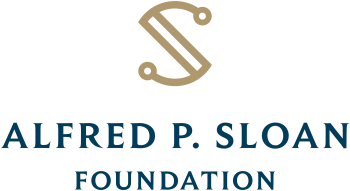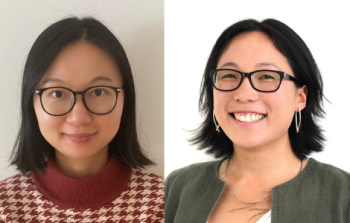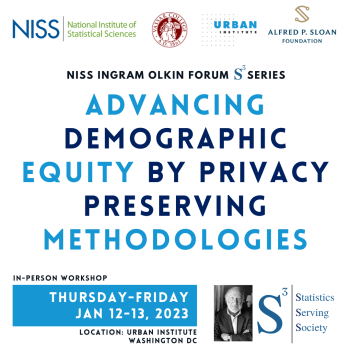[Please Note: This event has already taken place. Please review the News Story for this event to read about what happened.]
The in-person two-day NISS IOF workshop: Advancing Demographic Equity with Privacy Preserving Methodologies will be held at the Urban Institute in Washington, DC in January 2023! From this workshop, we will summarize the current challenges and future directions of this collaborative research and practice area in a white paper and / or manuscript. Working groups will be formed and expected to continue after the workshop. This workshop comes after our pre-workshop webinar held on November 1, 2022 with four panelists from academia, government, NGOs/Think Tanks, and data users/practitioners on “Current Challenges and Potential Future Work”.
In-Person Regsitration Deadline: January 4, 2023!
Proof of COVID-19 vaccination, including one booster shot,
is required to attend this event in-person.
Cost of Registration:
- $250 General Admission
- $125 for NISS Affliates (see List of NISS Affiliates here)
- (The Affiliate discount will be provided after the event.)
- Hotel Information, 480 L'Enfant Plaza, SW, Washington, DC 20024, (202) 484-1000
- The Cut-Off Date (Reservation Due Date) was – December 24th, 2022.
Registration Deadlines:
- In-Person Regsitration Deadline: January 4, 2023
- Online Registration Deadline: January 10, 2023
Motivation of this Ingram Olkin Forum:
On his first day in office, President Biden signed an executive order directing federal agencies and White House offices to examine barriers to underrepresented individuals and initiated several efforts to address equity for people of color and underserved communities. The executive order takes an unprecedented step by committing the government to actively pursuing more equitable engagement and outcomes across all agencies and policy areas.
However, many statistical agencies do not collect or release detailed demographic data and statistics due to growing concerns about disclosure risks. For instance, people of color with low incomes are more susceptible to privacy attacks because of their higher reliance on smartphones for internet access and how much personal information they give up for free cell phone app services. Such information collection makes them more easily identifiable, especially if they are outliers in small geographies.
To address these issues, some propose agencies to review and update their privacy protection methodologies with more modern data privacy and confidentiality techniques. However, as evident in the political discussions surrounding the 2020 Census, there is a lack of communication among policymakers, privacy researchers, and data practitioners about what privacy-preserving measures should be taken and their implications. This situation stagnated the conversation on improving access to more detailed demographic data.
Dissemination / Expected Output
NISS will host a two-day workshop in January 2023 to improve and strengthen the relationships among the privacy experts, researchers (e.g., social scientists, economists, and demographers), data stewards, data practitioners, and public policymakers. During the workshop, we hope to bridge the communication gap and identify what tools and educational materials are needed to improve expanding access to confidential demographic data for better public policy decision-making. In addition to connecting statisticians to public policymakers, we will write a white paper and / or manuscript suitable for journals such as Statistics and Public Policy on lessons learned and next steps that the data privacy and confidentiality community should take to move the conversation forward.
Component I: 1.5-hour webinar on November 1, 2022.
Component II: 2-day in-person workshop on January 12-13, 2023.
Component III: White paper / manuscript by August 2023.
During the workshop on January 12-13, 2023 we have planned 6 sessions with topics of statistical data privacy methods (synthetic data and differential privacy), challenges faced at federal statistical agencies and data users, applications and use cases, public policy and privacy law, and funding opportunities. Working roundtables are scheduled throughout the two-day workshop to facilitate close collaboration among participants that will continue after the workshop. In addition to connecting statisticians to public policymakers, we will write a white paper and / or manuscript suitable for journals, such as the Journal on Statistics and Public Policy, about the lessons learned and next steps that the data privacy and confidentiality community should take to move the conversation forward.
Confirmed Speakers / Participants for this Event Include:
Jingchen (Monika) Hu (Vassar College)
Claire Bowen (Urban Institute)
James Rosenberger (NISS)
Amy O'Hara (Georgetown University)
Terrance Savitsky (Bureau of Labor Statistics)
Ellen Galantucci (Federal Maritime Commission)
Jeremy Seeman (Penn State University)
Quentin Brummet (NORC)
Daneil Susser (Penn State University)
Joerg Drechsler (Institute for Employment Research (IAB), Germany)
Christopher Dick (DA Advisors / Georgetown University)
Daniel Goroff (Sloan Foundation)
Joshua Snoke (RAND)
John Abowd (Census Bureau)
Victoria Bryant (Internal Revenue Service)
Madeline Pickens (Urban Institute)
Darius Singpurwalla (National Center for Science and Engineering Statistics)
Matthew Williams (RTI International)
Don Jang (NORC)
Saki Kinney (RTI International)
Darius Mcdaniel (Drexel University)
Aaron Williams (Urban Institute)
Jae Jun Lee (Georgetown University)
Tom Krenzke (Westat)
Lisa Mirel (Center for Disease Control and Prevention)
Crescent Martin (Center for Disease Control and Prevention)
Sesa Slavkovic (Penn State University)
Wendy Martinez (Census Bureau)
Jennifer Andre (Urban Institute)
Rob McClelland (Urban Institute)
Graham MacDonald (Urban Institute)
Leonard Burman (Urban Institute)
Agenda
Date: January 12-13, 2023
Location: The Urban Institute, 500 L'Enfant Plaza SW, Washington, DC 20024.
Workshop Tentative Schedule: Topics are tentative and will be finalized by mid-December, 2022.
Sessions 1-6 are also available virtually (i.e., hybrid)
|
Day 1, Jan 12, 2023 |
|
|
9:30am - 10:00am |
Opening Remarks - James Rosenberger, NISS Director (15 minutes) Overview and goals for the workshop - Claire Bowen (15 minutes) |
|
10:00am - 11:00am |
Session 1: Introduction and Challenges in Statistical Privacy Part 1
|
|
11:00am - 11:15am |
Break |
|
11:15pm - 12:00pm |
Session 2: Introduction and Challenges in Statistical Privacy Part 2
|
|
12:00pm - 1:00pm |
Lunch |
|
1:00pm - 2:00pm |
Session 3: Applying Statistical Privacy Methods and Techniques Part 1
|
|
2:30pm - 2:45pm |
Break |
|
2:45pm - 4:00pm |
Working roundtables |
|
Day 2, Jan 13, 2023 |
|
|
9:30am - 10:30am |
Session 4: Applying Statistical Privacy Methods and Techniques Part 2
|
|
10:30am - 10:45am |
Break |
|
10:45am - 11:25am |
Session 5: Public policy and privacy law
|
|
11:25am - 1:30pm |
Lunch & working roundtables |
|
1:30pm - 2:30pm |
Session 6: Funding opportunities - virtual panel
|
|
Break |
|
Synthesis |
|
Closing |
Key Contributors:
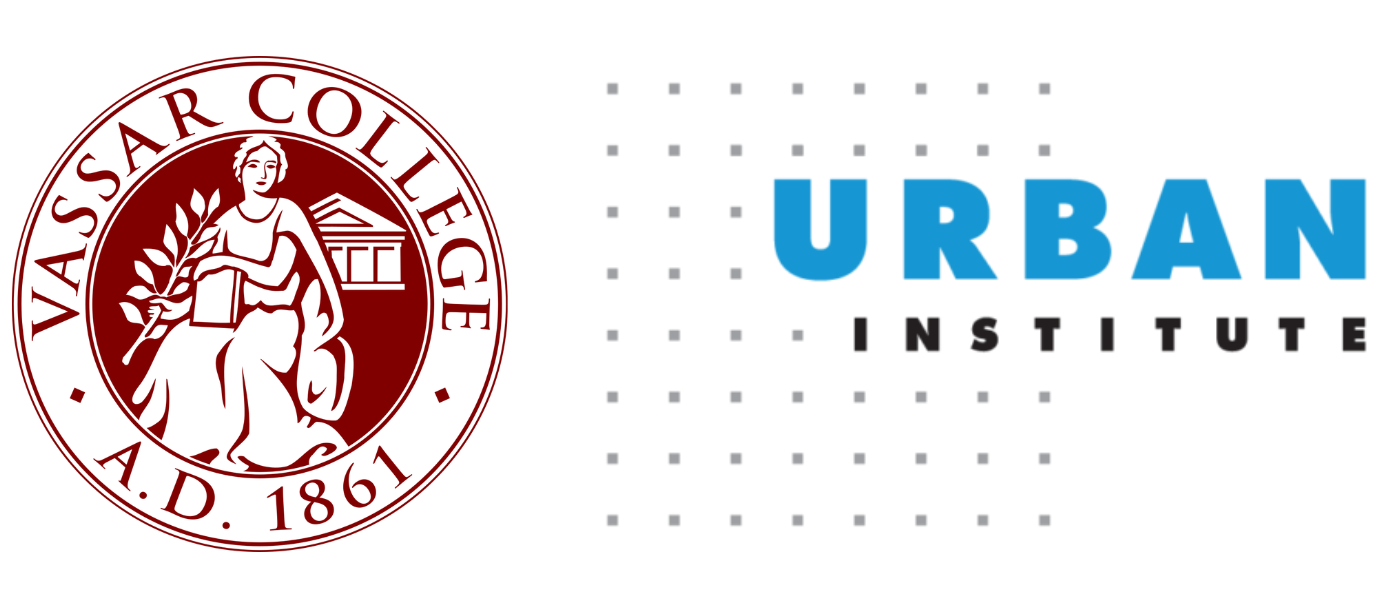
About the Moderators/Organizers:
Jingchen (Monika) Hu is an associate professor of statistics at Vassar College. Her research focuses on statistical data privacy methods, mainly synthetic data and differential privacy. She teaches a senior seminar on statistical data privacy at Vassar and engages undergraduate students in learning cutting-edge methods and conducting applied research in this area.
Dr. Claire McKay Bowen is a principal research associate in the Center on Labor, Human Services, and Population and leads the Statistical Methods Group at the Urban Institute. Her research focuses on developing and assessing the quality of differentially private data synthesis methods and science communication. In 2021, the Committee of Presidents of Statistical Societies identified her as an emerging leader in statistics for her technical contributions and leadership to statistics and the field of data privacy and confidentiality. She is also a member of the Census Scientific Advisory Committee and the Differential Privacy Working Group, an advisory board member of the Future of Privacy Forums, and an adjunct professor at Stonehill College.
Organizing Committee:
- Jingchen (Monika) Hu, Associate Professor, Vassar College
- Claire Bowen, Principal Research Associate, Urban Institute
Key Staff and Collaborators:
- Nancy Flournoy, Curators Distinguished Professor, University of Missouri
- David L. Banks, Professor of the Practice of Statistical Science, Duke University
- James Rosenberger, Director of National Institute of Statistical Science (NISS)
- Claire Kelling, PhD Candidate in Statistics and Social Data Analytics, Penn State University
- Wendy Martinez, Senior Mathematical Statistician for Data Science, U.S. Census Bureau
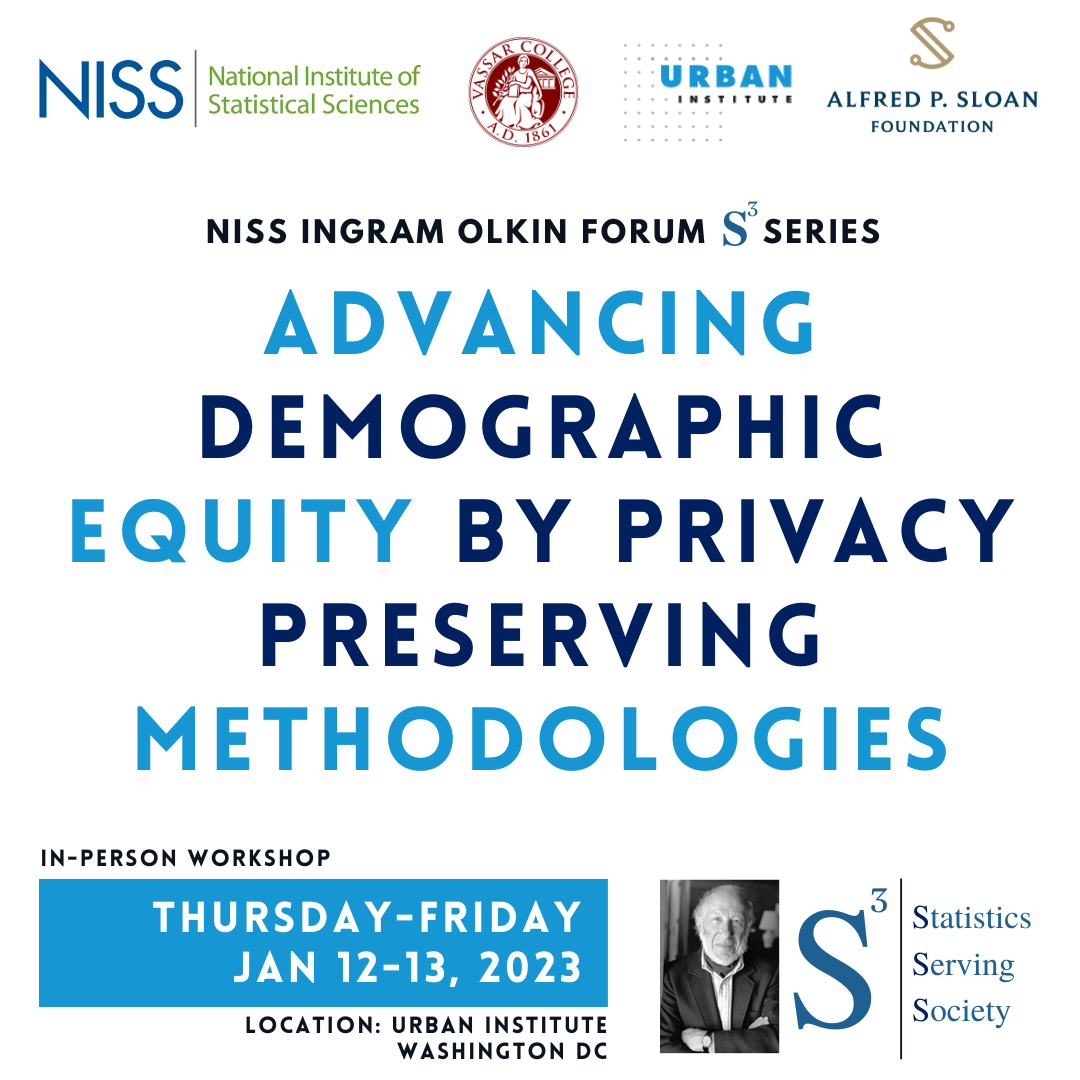
Event Type
- Affiliate Award Fund Eligible
- NISS Hosted
Host
Cost
Website
Location
Policy
